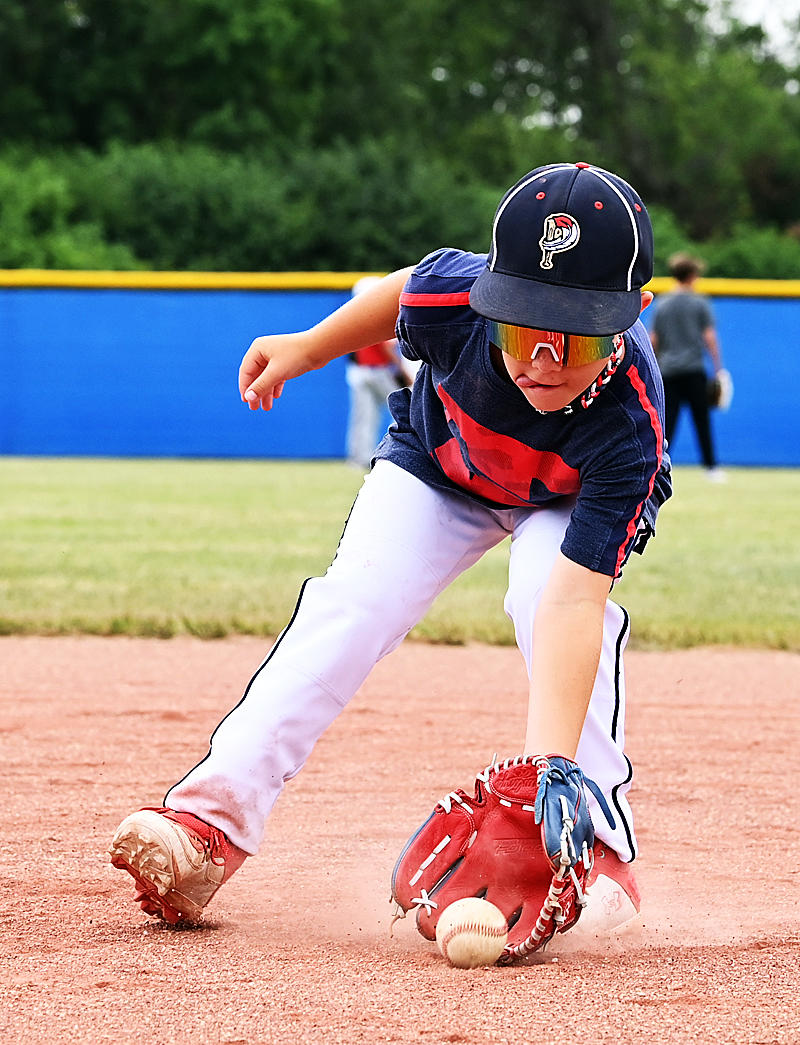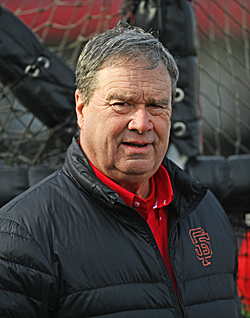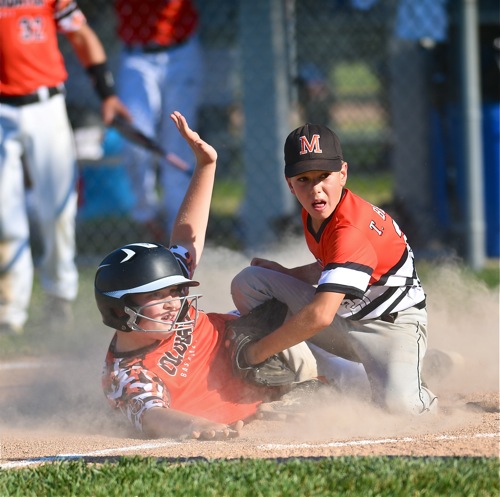
How do you teach youngsters to love baseball? “Once they learn how to play it’s hard to teach them to not love it,” says former Lehman coach, Dave King. (Press Pros Feature Photos)
Why community baseball is so important…and why it continues to pay dividends, like a pot of gold at the end of the rainbow.
 Minster, OH – At an OHSAA state tournament several years ago, a college coaching friend of mine watched the Division IV championship final between Russia and Minster.
Minster, OH – At an OHSAA state tournament several years ago, a college coaching friend of mine watched the Division IV championship final between Russia and Minster.
He was scouting for talent, of course, someone who could step on the field at Marietta College and make an impact immediately as an incoming freshman.
After watching for a couple of innings he snapped his three-ring binder shut and turned to me, saying, “You know, what these kids lack in size and metrics, they more than make up for what they know about the game. They know how to play. The rest of it will come to them, soon. They just need to grow.”

Publisher/Editor Sonny Fulks writes OHSAA and Buckeye baseball for Press Pros Magazine.
I’ve never forgotten his words, nor the logic behind them. He was so quick to recognize the value of what he was watching. “They know how to play the game.”
For years now I have questioned the recent phenomenon of ‘collective’ youth baseball, by where you assemble the twelve best players from points here and yon and call it a team. They’re the biggest, the most advanced for their age…and oh yeah, Dad’s got $2,500 to pay for the privilege of saying you play ‘Travel Ball’, or ‘Select Baseball’, or that you belong to an ‘Elite’ team.
Now there’s a point, obviously, where I guess there’s some value in it. When kids are 15, or 16, and want to test themselves against bigger and better competition, it’s their best alternative. But here’s why. We’ve so devastated the tradition of community baseball in rural Ohio (and urban, in many cases) that’s there simply not enough baseball for kids to experience at home.
There is no Babe Ruth ball anymore. No Pony League, no ACME ball, or Legion baseball. In my hometown in southern Ohio, there used to be 21 Little League teams. Now there’s two, and you have to pay…to travel and play. And you have to play the game if you want to get better at it!
I’m always reminded when I see the Minster Classic, or the Craig Stammen Classic, or similar events in St. Henry and Coldwater that home-schooling still works. Kids that grow up together, play together, teach each other, and respect each other often do turn out to be better teams when they get to high school, where their bodies and skills begin to catch up with their zeal to compete.
Craig Stammen, who played in the big leagues for a dozen years – who came out of Versailles youth baseball – will tell you, “There’s nothing like it”, and cite all the same reasons as above.
“Nothing takes the place of playing with your buddies against communities that you’re going to play some day in high school.”
And when you watch the Minster Classic you begin to understand why those kids do grow up to become better teams, over a team that has one or two advanced talents scattered among its lineup.
Adults are committed to work individually with them. They’re patient, understanding that while Rome wasn’t built in a day, neither is a catcher behind home plate. That’s a community thing, of course, the men who played the game themselves and eventually volunteer to coach and pay forward to succeeding generations.
But it’s the ‘dads’ in those communities that really make the difference. Men, like my own dad decades ago, who come home at the end of the day and talk baseball with their sons…who play catch in the backyard…and make a big deal out of a weekend trip to Great American Ballpark, or to Cleveland, to see the Reds or the Guardians play. They sell the game the same way they were once sold – anticipation, fun, and kids recognizing a new skill achieved, soon to be perfected.

All that orange lookin’ for a call…Minster 12-year-old pitcher Tyler Bergman tags a Coldwater runner out at the plate during action at a recent Minster ‘Classic’.
All that’s missing in ‘travel’ baseball, where coaches often show up in a T-shirt and flip flops, roll out of the car, play seven innings and go home. Practice between games is a catch as catch can thing, and more than one young player has admitted to me that “all that driving really isn’t much fun after a while.”
None of that is apparent at the Minster Classic. It’s about the best points of baseball for kids. Fun, learning, and learning with your friends. It’s supporting each other, cheering for each other, and yes, comforting each other on those days when nothing seems to go right.
It’s about knowing (and they all know) who the ultimate figure is in the community – the high school coach – and the dream of one day gaining his attention, and trust. You want to grow up to be a Minster Wildcat, or a Marion Flyer…a St. Henry Redskin. You fantasize at Versailles about walking in the steps of Craig Stammen. And that’s why what’s going on this weekend in Minster is so important.

High school head coach Mike Wiss is the man who keeps a close eye on community baseball in Minster.
Critics say that baseball is losing steam because there’s just so many other things for kids to do now. But look out on the field on Hanover Street and convince me of that. Kids will play baseball if they’re encouraged, trained, and given the chance.
They will succeed, as evidenced by nearly twenty state titles enjoyed by Minster. Loramie, St. Henry, Coldwater, and Russia.
And more importantly, they’re going to pass that on of the next generation!
A big league scout told me this spring, “The kid who doesn’t play high school baseball…do you think his kid’s going to play? And do you think that kid’s son is going to play? This is what’s really happening to community baseball. We’ve discouraged the ‘tweeners’ and the ‘late bloomers’.”
Meaning, you can only have so many ‘select’ players on the field. Beyond that, you need six or seven others who just know how to play the game…and love every minute of it – who learned to play the game at the community park.
Who will teach it to their sons, and to their son’s sons, and, well…you get the point.


